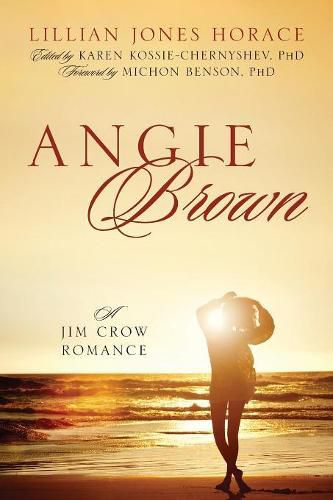Readings Newsletter
Become a Readings Member to make your shopping experience even easier.
Sign in or sign up for free!
You’re not far away from qualifying for FREE standard shipping within Australia
You’ve qualified for FREE standard shipping within Australia
The cart is loading…






This title is printed to order. This book may have been self-published. If so, we cannot guarantee the quality of the content. In the main most books will have gone through the editing process however some may not. We therefore suggest that you be aware of this before ordering this book. If in doubt check either the author or publisher’s details as we are unable to accept any returns unless they are faulty. Please contact us if you have any questions.
Angie Brown is a romance migration novel set in the Jim Crow era. Angie, the protagonist, determines to embrace all life has to offer despite the social restrictions facing young black southern women like her. Angie holds fast to her desire to find financial success, personal fulfillment, and true love, but she does not achieve her dreams alone, nor do they unfold in the same place. From Belle, her confidant; to Betty Yates, the teacher; to Chester, the pool hall owner; women and men from various social stations in life and different places share nuggets of wisdom with Angie. With their love and support, she overcomes tragedy, welcomes fresh possibilities, climbs the social ladder, and opens her heart to love. Angie’s progressive journey reflects the migratory trek of many African American Southerners of the Jim Crow era, who left the South for greater educational and economic opportunity. Her quest leads her from a small segregated community to Hot Springs, Arkansas, and eventually to the Midwest, including St. Louis, Missouri, Chicago, and Southern Illinois. As Angie travels from place to place, she gradually comes into her own and learns key life lessons. Angie learns that struggle is universal. While doing domestic work, she discovers that whites, who live on The Other Side, also experience pain, suffering, and grave disappointment. Love eludes white women, too, and they, too, face gender discrimination. Having overcome her fair share of personal losses, Angie reaches across racial lines to console Gloria, a member of the Parker family, for whom Angie does domestic work. Her experience with the Parker’s is juxtaposed to her dealings with the Mungers, a rich, Northern white family she meets. Although the Mungers are kind to Angie, she learns that life beyond the South is not perfect. Yes, she and other blacks face less virulent forms of racism outside the South, but economic stability and educational opportunity are not easily achieved. Segregation by r
$9.00 standard shipping within Australia
FREE standard shipping within Australia for orders over $100.00
Express & International shipping calculated at checkout
This title is printed to order. This book may have been self-published. If so, we cannot guarantee the quality of the content. In the main most books will have gone through the editing process however some may not. We therefore suggest that you be aware of this before ordering this book. If in doubt check either the author or publisher’s details as we are unable to accept any returns unless they are faulty. Please contact us if you have any questions.
Angie Brown is a romance migration novel set in the Jim Crow era. Angie, the protagonist, determines to embrace all life has to offer despite the social restrictions facing young black southern women like her. Angie holds fast to her desire to find financial success, personal fulfillment, and true love, but she does not achieve her dreams alone, nor do they unfold in the same place. From Belle, her confidant; to Betty Yates, the teacher; to Chester, the pool hall owner; women and men from various social stations in life and different places share nuggets of wisdom with Angie. With their love and support, she overcomes tragedy, welcomes fresh possibilities, climbs the social ladder, and opens her heart to love. Angie’s progressive journey reflects the migratory trek of many African American Southerners of the Jim Crow era, who left the South for greater educational and economic opportunity. Her quest leads her from a small segregated community to Hot Springs, Arkansas, and eventually to the Midwest, including St. Louis, Missouri, Chicago, and Southern Illinois. As Angie travels from place to place, she gradually comes into her own and learns key life lessons. Angie learns that struggle is universal. While doing domestic work, she discovers that whites, who live on The Other Side, also experience pain, suffering, and grave disappointment. Love eludes white women, too, and they, too, face gender discrimination. Having overcome her fair share of personal losses, Angie reaches across racial lines to console Gloria, a member of the Parker family, for whom Angie does domestic work. Her experience with the Parker’s is juxtaposed to her dealings with the Mungers, a rich, Northern white family she meets. Although the Mungers are kind to Angie, she learns that life beyond the South is not perfect. Yes, she and other blacks face less virulent forms of racism outside the South, but economic stability and educational opportunity are not easily achieved. Segregation by r